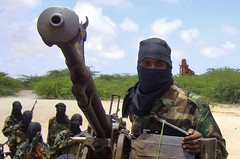
Islamic resistance forces have stepped-up their efforts to seize power from the U.S.-backed Transitional Federal Government based in Mogadishu. The airport was attacked and many AMISOM soldiers were killed.
Originally uploaded by Pan-African News Wire File Photos
24.10.2010
04:27
At least 25 people have lost their lives in heavy clashes between Somali government troops and al-Shabab fighters in southern Somalia, near the border with Kenya, Press TV reported.
The fighting broke out late on Thursday in Belet Hawo. The town switched hands on October 17 after government forces captured it from al-Shabab fighters, who had taken control of the area in January 2009, Radio Garowe reported.
A witness said many residents fled from the town after the battle began and most of those killed were militia members. Some 50 people sustained injuries during the fighting.
The International Committee of the Red Cross (ICRC) warned on Thursday that hundreds of civilians have been injured in fighting in Somalia over recent months.
The Geneva-based humanitarian institution said that a total of 5,000 patients with war injuries, including 1,900 women and children, were admitted to Mogadishu's Keysaney and Medina hospitals from January through September.
Compared to last year, it is an increase of 25 percent in the total number of war casualties and 72 percent in the number of war-wounded women and children admitted to the hospitals.
Some 4,000 patients with war injuries, among them 1,100 women and children, were taken to Mogadishu's two referral hospitals in 2009.
Somalia has not had a functioning government since 1991, when warlords overthrew former dictator Mohamed Siad Barre.
Over the past two decades, up to one million people have lost their lives in fighting between rival factions and due to famine and disease.
There are more than 1.4 million internally displaced people (IDPs) in Somalia. Over 300,000 of the IDPs are sheltered in Mogadishu.
Most of the displaced live in poor and degrading conditions on makeshift sites in southern and central Somalia, according to the United Nations High Commissioner for Refugees.
No comments:
Post a Comment